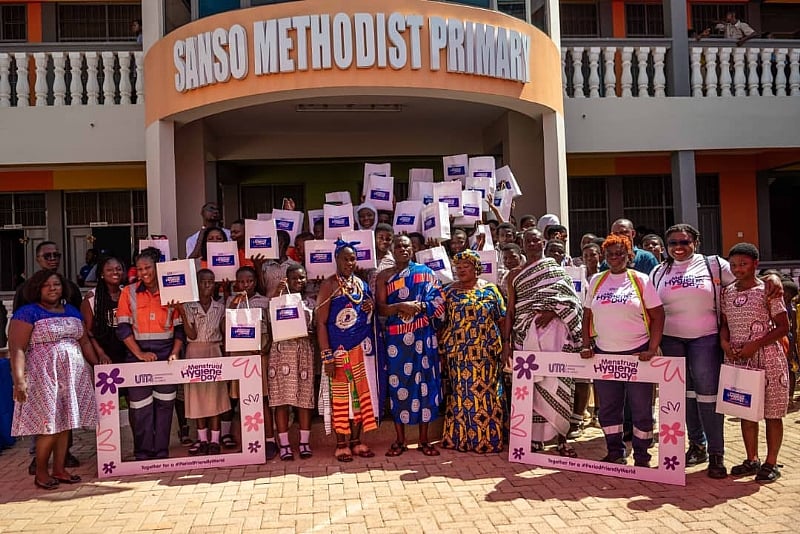Menstruation, a natural biological process signifying female reproductive maturity, remains shrouded in silence and misconception in many parts of Ghana. Deep-rooted socio-cultural and religious beliefs have contributed to the perpetuation of this taboo, hindering open discussions about menstruation and its management. This societal reticence has far-reaching consequences, particularly for adolescent girls, impacting their physical and mental well-being, educational opportunities, and overall self-esteem. The lack of accurate information and access to hygienic menstrual products leaves many girls vulnerable to poor health, school absenteeism due to discomfort and embarrassment, and a diminished sense of confidence during a crucial stage of development. Addressing this critical issue requires a multi-pronged approach involving education, resource provision, and a societal shift in perspective.
Recognizing the urgency of this challenge, the Underground Mining Alliance (UMA), a contractor of AngloGold Ashanti Obuasi Mine, has taken a proactive stance by launching a comprehensive menstruation education campaign. This initiative, targeting both girls and boys, aims to destigmatize menstruation and foster a more supportive and understanding environment for young women. By normalizing menstruation as a natural part of life, UMA seeks to empower girls to embrace their bodies and manage their monthly cycles with confidence and dignity. The program’s inclusive approach, involving boys in the conversation, is particularly significant. Educating boys about menstruation dismantles harmful stereotypes, promotes empathy, and fosters a culture of respect and understanding, contributing to a more supportive social environment for girls. This collaborative approach is essential in fostering a positive and inclusive environment for all.
The campaign’s impact is further amplified by UMA’s donation of both reusable and disposable sanitary pads to schoolgirls in surrounding communities. This practical support ensures that girls have access to the necessary resources to manage their periods hygienically and discreetly, mitigating the risk of infection and discomfort. The provision of reusable pads, in particular, is a sustainable solution that empowers girls with long-term access to menstrual hygiene products, reducing their dependence on external sources. This approach also addresses the potential financial burden of purchasing disposable pads regularly, a significant consideration for families in resource-constrained settings. The donation of a six-month supply of sanitary products provides a crucial bridge, giving girls and their families time to adjust and plan for future needs.
UMA’s commitment to menstrual hygiene education and resource provision underscores a broader corporate social responsibility philosophy. Yvonne Adomako Asabre, a representative of UMA, emphasized the company’s dedication to supporting its host communities through initiatives that address critical social issues. She highlighted the important role of parents in facilitating open communication about menstruation with their daughters. Asabre’s call for parental involvement reinforces the idea that education must extend beyond the classroom and into the home. Open dialogue within families can dismantle the taboos surrounding menstruation and empower girls to navigate this aspect of their development with confidence and support. This collaborative approach, involving schools, families, and community stakeholders, creates a strong foundation for lasting change.
Mavis Nana Yaa Kyei, Gender and Social Development Superintendent at AngloGold Ashanti, further reinforced the message of empowerment by urging girls to embrace menstruation without shame or embarrassment. Encouraging girls to speak openly about their experiences, ask questions, and seek support normalizes menstruation and dismantles the secrecy that perpetuates stigma. Kyei’s message emphasizes that menstruation should never be a barrier to educational attainment or personal growth. Linking the initiative to AngloGold Ashanti’s 10-Year Socio-Economic Development Plan, Kyei highlighted the importance of education for girls’ overall empowerment. By removing obstacles like period poverty and stigma, AngloGold Ashanti is contributing to a more equitable educational landscape where girls can realize their full potential. This integrated approach, addressing both practical needs and social perceptions, creates a more inclusive environment for girls to thrive.
The impact of the program is evident in the positive responses from the girls themselves. Elizabeth Appiah, a 12-year-old student, expressed her newfound confidence after attending the educational session. Her ability to calculate her menstrual cycle and understand how to manage her period hygienically demonstrates the tangible benefits of the program. Empowering girls with knowledge and resources not only improves their physical health but also strengthens their self-esteem and reduces anxiety surrounding menstruation. This combination of education and practical support equips girls with the tools they need to manage their menstrual cycles effectively and confidently. Through such initiatives, UMA and AngloGold Ashanti are working to create a future where menstruation is no longer a source of shame or a barrier to education, but a normal part of life that is embraced with understanding and support. This comprehensive approach, combining education, resource provision, and community engagement, is paving the way for lasting change and a more equitable future for girls in Ghana.


